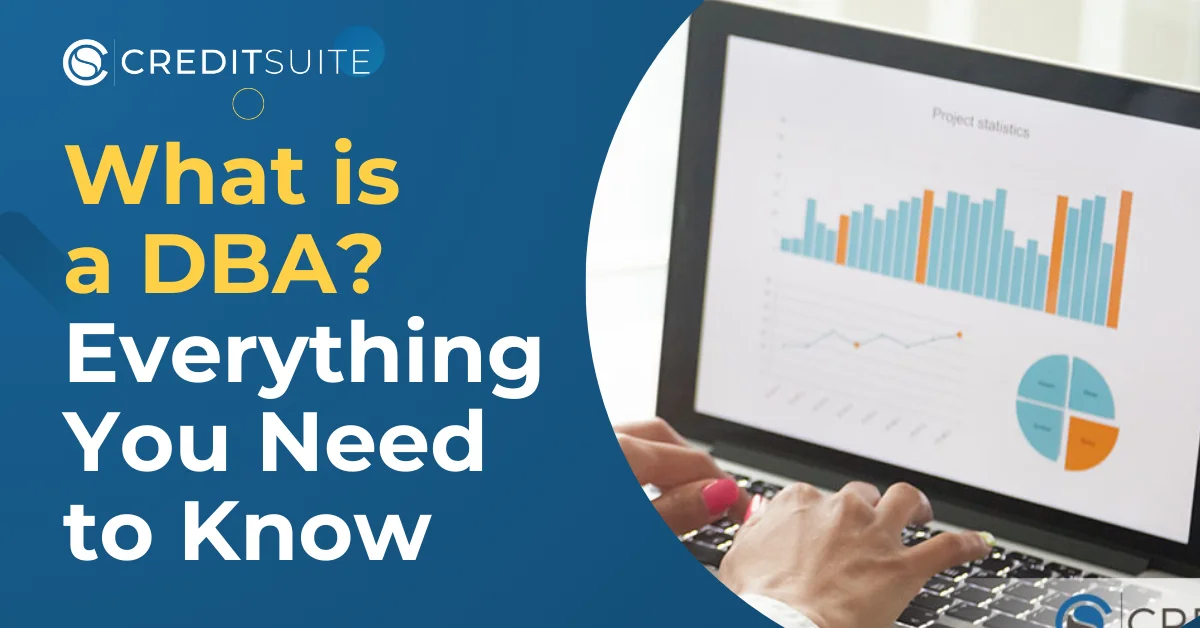What You Should Know About DBAs – One Way to Take Charge of Your Business
Do you know what you should know about DBAs and the potential they have for your business?
Before going any further, you are probably wondering: what is a DBA? DBA stands for ‘doing business as’, and it is a fictitious name filing for your small business. It’s also called an assumed business name.
If you’re asking, why do I need a DBA, and let’s say your name is John Smith. You probably do not want your business to just be called ‘John Smith’. And this is particularly when you are trying to create a business which will build a business credit score.
What You Should Know About DBAs: It Makes a Difference in Business Credit Building in Particular
Can you get business credit with a DBA? When looking at business credit score vs personal credit score, a lender is going to become awfully confused if your name and the name of your business are identical. And this is particularly if you are a sole proprietor.
When business and personal credit are mixed, what affects business credit score the most is when your business credit score building activities end up not helping out your business at all.
So take the confusion out of the equation. This means meaning certain that the credit scoring bureaus, the Internal Revenue Service, and your lenders and creditors all know that you and your small business are two separate entities.
What You Should Know About DBAs: Why Get a DBA?
For a one-person operation, you might have a company name. But the general public does not necessarily know who you are.
So for example, if the name of your business is Mimi’s Flowers, then you will need a DBA. This is because there is probably more than one person named Mimi in your area.
But if you call your business Mimi Smith’s Flowers, you might be able to get away without a DBA. Still, it would not hurt to have one.
Why Use a DBA? It’s for Protecting the Public
The public has a vested interest in knowing who actually owns which business. This is due to liability issues. So if you own a food truck and someone gets food poisoning, they won’t know you own Mayfair Mac ‘n Cheese without a DBA.
And it’s also for tax issues. I’ll get to those in a moment. And it’s even for business credit issues. I’ll get to that, too.
According to FreshBooks, a DBA lets the public know who’s running the show.
What You Should Know About DBAs: Sole Proprietorships
The SBA defines a sole proprietorship as an unincorporated business. Such a business is owned and run by one person. There is no material difference between the business and the owner.
This means that you, the owner, will enjoy all of profits. But you are also responsible for all your business’s debts, losses, and liabilities.
What is the Purpose of Having a DBA if You’re a Sole Proprietor? Personal Asset Protection
By separating out your personal life and credit from your business life and credit, you can protect your personal assets.
Otherwise, if the business goes bankrupt and there aren’t enough funds to pay its creditors, then guess what? Your business’s creditors will come after your car, your boat, your money, etc.
So there can be personal protection with a DBA. Although to really protect your private assets, incorporating is best.
What You Should Know About DBAs: Satisfying IRS requirements
The Internal Revenue Service treats a DBA as an extension of a sole proprietor. Therefore, there is no need for a separate EIN for the business. An EIN is an employer identification number, sometimes also called a TIN, or a tax ID number. These are references to the same thing, a nine-digit identification number.
If you do not file for a DBA as a sole proprietor, then your personal name is the same as the small business name. Hence, you can wind up being personally responsible for all business debts.
Why Do You Need a DBA? Audits!
Also, per the IRS, using this arrangement there is a 1 in 7 chance of an IRS audit. There is a 1 in 50 possibility for corporations! Avoid confusion and dramatically reduce the chances of an Internal Revenue Service audit at the same time.
LLCs
You may be asking: Do I need a DBA for my LLC? What if your business is a corporation or an LLC (limited liability corporation)? If it is, then the IRS already considers those to be separate entities. Those kinds of business configurations will need EINs. That will alleviate the need for a DBA.
But even a corporation can use a DBA.
Dealing with the Internal Revenue Service When You Want to Go Past a DBA
Visit the IRS website and get an EIN for the company. They’re totally free. Choose a business entity such as corporation, LLC, etc.
A small business can begin as a sole proprietor. But you will probably wish to switch to a variety of corporation or LLC to minimize risk and maximize tax benefits.
A business entity will matter when it comes to tax obligations and liability in case of litigation. A sole proprietorship means the owner is it when it comes to liability and tax obligations. No one else is responsible.
What You Should Know About DBAs: Separating Business and Personal Credit
When you operate a business by yourself you can continue the confusion. This can happen if you commingle the accounts. Or it can happen if you float your business a loan without interest. And another way is if you sign checks from your own accounts versus a business account.
When you apply for business credit, lenders and creditors will naturally look to your personal credit because that invariably has been around for far longer.
With a DBA, you can still be a one-person show. But it is one (of many) indicators that you have a business and not a hobby. And that your business should be treated as a business. It also means it’s time to start building business credit.
The Process
Building small business credit is a process, and it does not occur without effort. A company will need to proactively work to establish small business credit. That being said, it can be done readily and quickly, and it is much faster than building individual credit scores.
Merchants are a big aspect of this process.
Carrying out the steps out of order will cause repetitive denials. No one can start at the top with corporate credit.
Company Fundability™
A small business has to be Fundable to lending institutions and vendors. As a result, you will need to incorporate—a DBA won’t do that.
Plus, a corporation will need a professional-looking web site and e-mail address, with site hosting from a company such as GoDaddy.
Plus company phone numbers need a listing on ListYourself.net.
In addition the business telephone number should be toll-free (800 exchange or the like).
A company will also need a bank account devoted solely to it. And it has to have every one of the licenses essential for operation. These licenses all have to be in the accurate, correct name of the company. And they must have the same business address and phone numbers.
So bear in mind that this means not just state licenses, but potentially also city licenses.
What You Should Know About DBAs: More Reasons to Get a DBA
It is quite simply the easiest way to register your business. If you knit tea cozies and sell them on Etsy, then you will have a storefront with a legit business name.
Why DBA is important: you will need a DBA to be able to open up a business account in your company’s name. And you’ll need it to receive payments or pay bills.
For your one-person operation on Etsy, it’s a lot more impressive if you can call it Dragon Tea Cozies. That is, rather than Sarah Smith’s Etsy store. And your company will look larger!
Multiple Businesses
You can even use a DBA to operate several separate businesses at once. You can actually create a corporation which will use the DBA. This is useful if you open new branches or websites.
So your Friendly Corporation might be doing business as Dragon Tea Cozies, Mimi’s Flowers, and Good Vibes Night Club. And this is all at the same time.
Match Incorporated and Unincorporated Businesses
Another use for these kinds of multiple DBA situations is when one business is incorporated and another is not. If you use a different name when signing contracts or leases, you might lose protections from being incorporated.
But by using a DBA structure, you should be fine. This is because it makes it clear to all and sundry that it’s a corporation doing business. And corporations have various legal and tax protections.
What You Should Know About DBAs: Back to You
The steps for getting started with a DBA vary from state to state. So check your Secretary of State’s website for the details. For example, in Massachusetts, you go here. In Colorado, here.
Can you build business credit with a DBA? If you’re incorporated, then yes!
A DBA adds professional cachet to a one-person operation. Tell your company’s story about when you used what you should know about DBAs.

